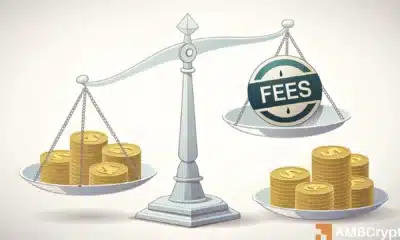Bitcoin
Bitcoin and Ethereum caught in the crosshairs of U.S. credit rating
Cryptocurrencies are heavily correlated to the stock market, and the latter has a tendency to crash during tough economic times. If Bitcoin and ETH are still correlated to the SP500, they might also turn bearish.

- Investors should keep a close eye on Bitcoin and Ethereum correlation with the S&P 500.
- Bitcoin and Ethereum could turn bearish now that the U.S. seemed closer to debt default.
You may have heard that Bitcoin [BTC] and Ethereum [ETH] were created as alternative asset classes that would be ideal inflation hedges. However, that was not the case during the crash of 2022 during which crypto prices crashed as inflation soared.
Is your portfolio green? Check out the Bitcoin Profit Calculator
The reality of things is that Bitcoin and Ethereum are heavily correlated to the stock market. Economic factors, in particular, are essential in determining the market outcome.
As such, recent developments have triggered a lot of uncertainty regarding Bitcoin and Ethereum’s performance for the rest of 2023.
Will the recent U.S. credit downgrade affect Bitcoin and Ethereum?
Credit rating agency Fitch Ratings recently downgraded its U.S. debt rating from AAA to AA+. There has since been speculation that a credit crunch and higher interest rates might be on the way.
Investors are now afraid that a debt default could be on the way and that it may lead to inflation and an economic recession. We must first look at how these factors might influence Bitcoin and Ethereum.
Cryptocurrencies were heavily correlated to the stock market. The latter usually crashes during tough economic times. If Bitcoin and ETH are still correlated to the SP500, they might also turn bearish.
Interestingly, recent findings suggest that there was still a significant level of correlation that aligned with the ongoing investor caution.
? #Bitcoin and #Ethereum remain firmly entrenched with the ebbs and flows of the #SP500. The dollar has risen these past couple weeks, which has historically foreshadowed market pullbacks. Look for reduced correlation as a breakout signal for #crypto. https://t.co/cMB4w8Abv3 pic.twitter.com/1NA8KfitzN
— Santiment (@santimentfeed) August 3, 2023
According to analyst Sean Foo, the U.S. government is at risk of a debt spiral, which could eventually trigger a recession. Stocks could crash under such conditions, and Bitcoin and Ethereum correlations mean cryptocurrencies could be in trouble too.
On the other hand, many still believe that both Bitcoin and Ethereum are still good hedges for when economic collapse finally happens. This outcome is possible under low correlation conditions. Lower demand for the dollar would also likely be among the biggest factors fueling demand for Bitcoin and Ethereum.
How soon will that happen?
Mr. Sean Foo noted that the recent U.S. credit downgrade has unexpectedly triggered more demand for the dollar. He explained that the dollar’s global reserve currency status meant that there was heavy demand for the currency from across the globe. In other words, there might not be much of an impact in the short-term.
How much are 1,10,100 BTCs worth today?
The analyst believes that U.S. credit repayments could go higher and this would raise the risk of a default on bond yields. It might force the U.S. to print more money, thus devaluing the dollar.
If this happens, demand for assets such as gold, Bitcoin and Ethereum will likely be higher. However, that outcome is not expected to take place within the next 12 months.

